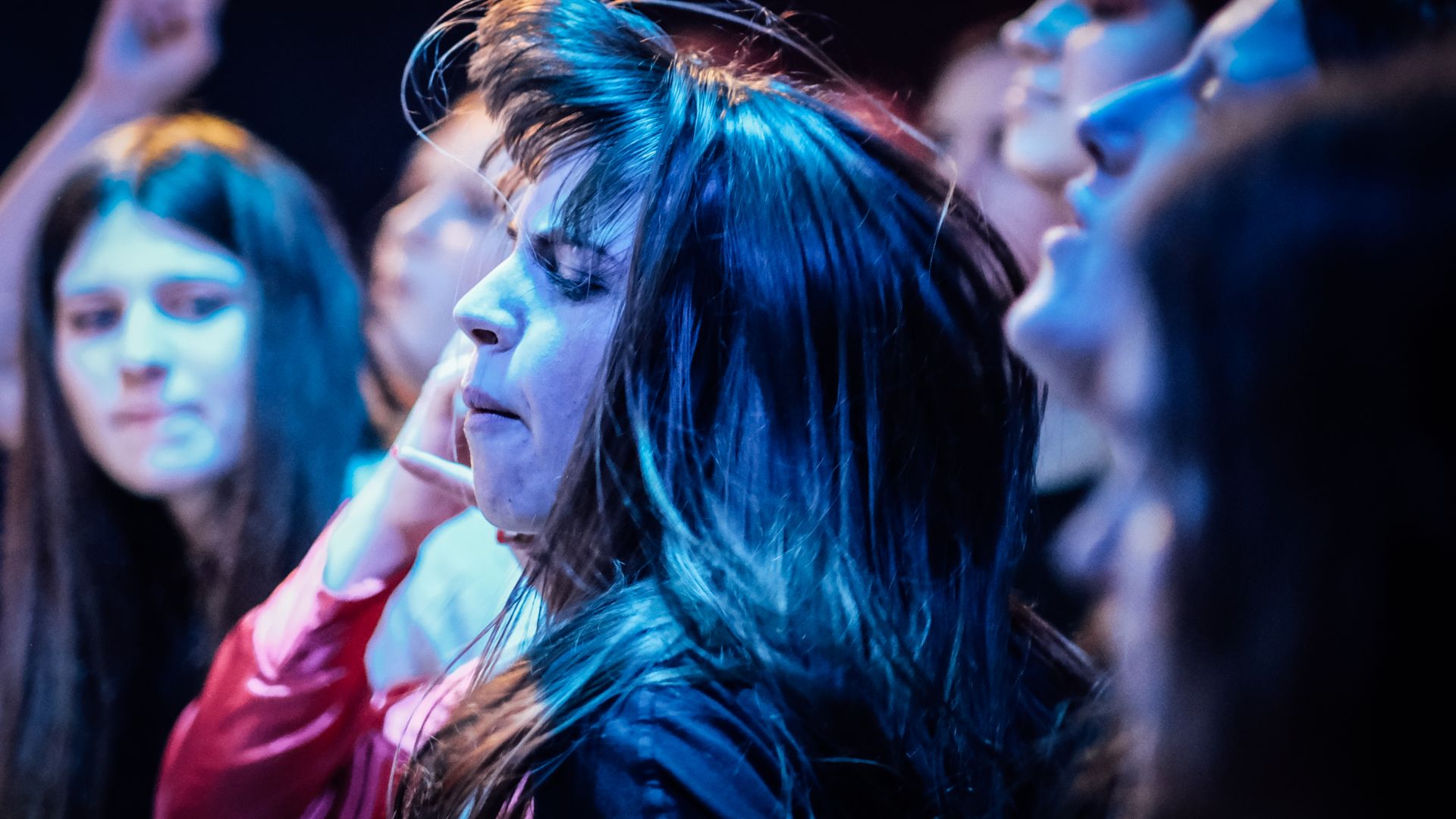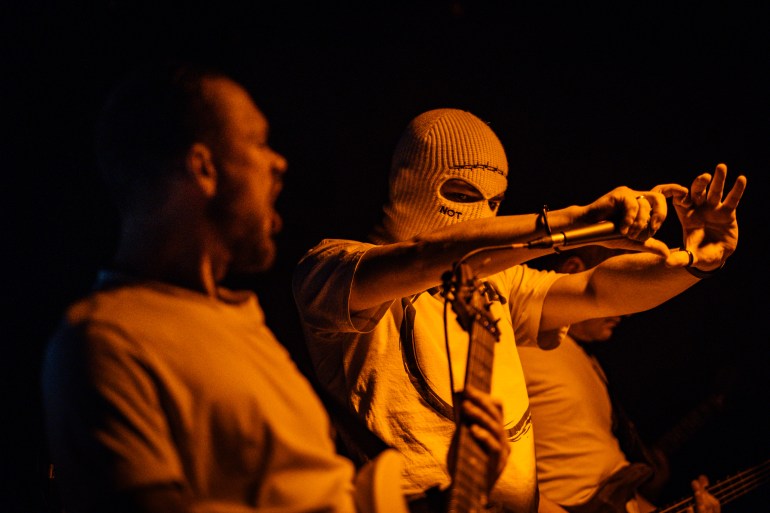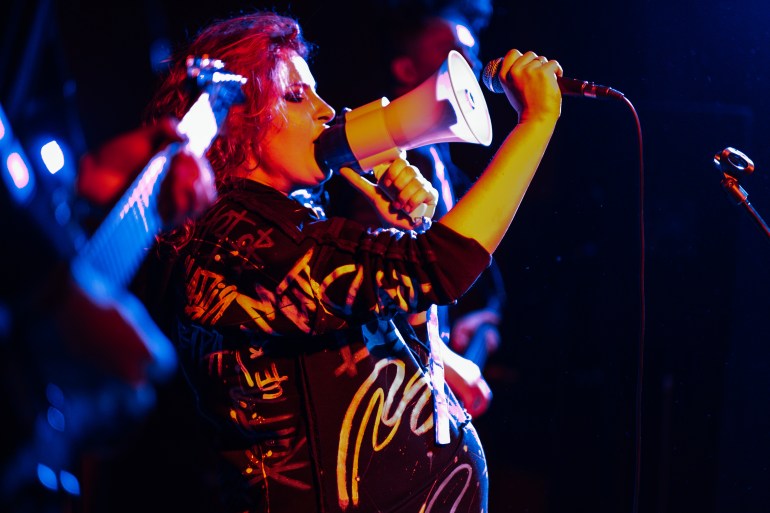'Dance like there is no tomorrow'
Inside Ukraine's underground wartime music scene.

Listen to this story:
Lviv and Kyiv, Ukraine - Boghdan Sulanov, the fast-talking vocalist of a heavy metal rock band called YAD, traverses a crammed backstage area. He edges past a guitarist who has just finished a high-octane, adrenaline-fuelled set, leaving him drenched in sweat, and reaches a small table piled with audio equipment, tea and biscuits. From underneath the table, he fishes out a rucksack with the clothes he will soon wear onstage.
The concert hall, an intimate venue in the western Ukrainian city of Lviv, is covered in music posters and on a night in early February, it is packed with several hundred rock enthusiasts eagerly awaiting the next performance. The atmosphere is electric, and Sulanov is excited.
“Young people didn’t appreciate music in the same way before the war,” says the 33-year-old, referring to Russia’s full-scale invasion of his native Ukraine on February 24, 2022.
“Our band always sing about our problems, and right now, it is that we want to survive,” says Sulanov, as he takes in the frenetic backstage atmosphere.

During the weekdays, Sulanov works as a software developer, but in his free time, he's a rock star. “We all need to work, but we also need energy, and this can come from music!” he says, before politely excusing himself to prepare for his set.
On stage, Bohdana Nykyforchyn, a 35-year-old singer with shoulder-length dyed red hair, screams into a microphone while her bandmate pounds away on a drum set.
Nykyforchyn transports the room through a range of emotions, alternating between soft melodic tones and more aggressive, fast-paced vocals. At one point, her voice cracks, and she looks like she might cry. After her set, she explains why. “I am eight months pregnant, and my dream was to climb this stage,” she says. “When the second song came on, I felt all my emotions bubble up. My hormones are everywhere!”

Backstage, Sulanov has transitioned into his on-stage persona, dressed all in white. His eyes peer through a balaclava with the words “not nice” emblazoned on it.
The members of YAD run out onto the stage, and the audience, ranging from fresh-faced teenagers to grey-haired middle-aged rockers, erupts in excitement. The people standing in the front row scream out the words to their songs, including a young boy who looks to be about 10 years old. The guitarist briefly stops strutting around the stage when he spots the boy and gives him a heartfelt thumbs-up.
Marichka Chichkova, the event organiser who is helping out at the bar, admits that although heavy metal is not her preferred music genre, she is happy to see all the people enjoying themselves. She looks up at the stage and remarks, “It’s also a release for musicians; this is very important, too”.
An escape
Since the outbreak of war, the underground music scenes in Ukraine’s major cities, such as Lviv and Kyiv, have seen a surge in creativity and popularity as musicians and music lovers seek an escape from wartime realities. In particular, the techno and rock music scenes have seen a new generation of DJs and bands burst onto the scene, infusing the sounds and experiences of war into their music.
The venue where Sulanov was playing is located in the basement of an elegant baroque building in the centre of Lviv. It was used as a bomb shelter in the early weeks of the war, but after April 1, 2022, when Chichkova organised a charity concert, it has hosted regular music events.
Many of the bands who perform at the venue, including YAD, donate any profits to the Ukrainian military.
In a break between performances, event organisers climb the stage and auction off two items, a T-shirt and a framed family photo, from lost and found to raise money for the war effort.

After YAD finish their performance to raucous applause, everyone spills out into the cobblestoned square outside. People pile onto the countless rickety trams that wind their way around the historic quarter, making their way home before the wartime 11pm curfew kicks in.
Max Antoniuk, a gregarious 30-year-old music enthusiast, was impressed by the evening's lineup. Since the war began, there has been “an explosion of music creation", he explains excitedly. Before, he says many musicians were driven by a desire to be snapped up by a big music label, but he says now artists in Ukraine are “producing music with no commercial interest”, giving a big boost to the underground music scene.

Denys Levchunets, a softly-spoken engineer who is learning to play the guitar from one of YAD’s members, reflects on how Ukrainian music trends have changed since the start of the war. “Now our existence is threatened, the topics have changed, and the language has changed,” explains the 30-year-old. “Many artists who used the Russian language before now only use Ukrainian”, while musicians are more focused on topics like Ukrainian historical heritage and national identity as well as issues related to freedom and democracy.
Ukrainians are also listening to local artists much more than they used to. Levchunets pulls up the top 30 charts in Ukraine on the streaming service Spotify and counts only two foreign artists, one Russian and one from the United States; the rest are Ukrainian. Before the war, he explains, foreign artists would have dominated this chart.
‘Dance till my arms and legs break’

An eight-hour train ride east of Lviv, in the historic Podil district of Ukraine’s bustling cosmopolitan capital, Kyiv, sits Closer, an underground techno club.
A cacophony of different electronic beats drifts through a ramshackle network of passageways and graffitied buildings located near the river Dnieper that splits the city in two. It’s late afternoon, and clubgoers gather on a small terrace to smoke and get some fresh air.
There is a diverse mix of outfits on display, from practical, warm fleeces to fishnet tank tops. A soldier walks past in combat slacks, sharing a joke with his friends as they head towards the upstairs dance floor; no one bats an eyelid.

In one of the rooms guarded by a friendly bouncer with a shaved head, a Ukrainian flag hangs on a wall as a DJ blasts out a slow beat with a heavy baseline. The dance floor is filled with around a dozen people, including several men with sunglasses who gently sway from side to side. When the beat drops, they burst into action, throwing their arms up in the air as strobe lights shoot across the room with dizzying frequency.
Mischa Muzychny, originally from Zaporizhia in southeast Ukraine and wearing a leopard skin print shirt, bounces about on the dance floor. “I love trance music - it is my life,” explains the 20-year-old enthusiastically.
Since the war began, he says, “I feel I want to dance so much more, I want to dance till my arms and legs break!”

His friend Milan, also 20, is a more placid character, and says, music “makes me happier during wartime. We need to feel relaxed. You can’t stop doing things. You need to feel the rhythm and just chill.”
Tanya, a shy 18-year-old clubgoer, says, “Clubs are like a place I can be myself, and no one can judge me. A place I can chill from the war and all the bad news.”
‘You can hear the war’
Andrei Savinykh, a 36-year-old DJ with a groomed moustache and neat blonde curtained hair, who goes by the stage name DJ Superelite, sips on a beer in a small room at the back of a cosy bar in central Kyiv. Slow-paced, mellow electronic music fills the space, which is lit with dim red bulbs.
He is measured as he speaks, reclining on a large cushion alongside his fluffy dog. “It is completely different performing now than before the war,” he announces. “Now,” he pauses, looking for the right word, “it feels fresher. People dance like there is no tomorrow”.
“Things are more interesting now; people feel closer to each other,” he says.
Savinykh, who often performs at Closer, says that techno clubs in Ukraine had previously executed a “strict face control” where people would be allowed into a club if they “looked right or knew the DJ”. Now, he says, “people are more sensitive and this approach is no longer popular”.

Savinykh was recently given special dispensation to perform in Berlin. Ukrainian men between 18 and 60 are banned from leaving the country under martial law. However, exemptions can be granted to musicians, artists and other cultural figures deemed to promote Ukrainian culture abroad. Going abroad helped him reflect on what has changed in the last year at home. It taught him that the music industry in wartime Ukraine has “created a new generation of talent” when compared to other countries.
“There are new DJs appearing all the time here,” he says. “Yesterday, I saw a DJ performing who was only 20, but he seemed as experienced as me.”
War is also creating a unique sound. “There are more Ukrainian vocals in the music, it is more patriotic,” he says, adding that much of the music can feel darker. He uses the example of music produced by a friend who has served on the front lines. “If you listen carefully, you can hear the war; there is a speedy baseline with a rat-at-at-at, like a gun,” he says, motioning as if he is firing a weapon with his hands.
Savinykh says that techno, which is more of an “underground scene in Kyiv”, has become much more popular since the war. “Underground music is more important because artists just make what they want, what they feel,” he says. “It is more true, and that is what people need now.”
‘When I play, I forget everything’

The distant thud of electronic music fills an industrial quarter in Kyiv. It’s a Saturday and around 9pm, and all the local businesses are closed. Suddenly a door to a nondescript grey concrete building with a crumbling facade swings open, and warm red light spills out. Two people push their way through layered plastic sheets and light up a cigarette. Inside sits an immaculately designed room, complete with a Persian rug. A large sculptural face hangs in front of a DJ mixer, and giant speakers emit a crisp sound.
A DJ stands hunched over the decks. Behind him, a live stream of the performance is projected onto a screen. It’s a private event, with around 20 people. Some are getting ready to leave to make it home before the 11pm curfew; the rest - who would face being arrested if driving or walking in public after this time - will party all night.
Nelson Vasetska, a friendly, erudite 40-year-old interior designer and one of the event's organisers, explains that whilst many felt that music was an escape during the early months of the war, she had a very different response. Vasetska, who DJs as a hobby and at events, says she felt she “should be quiet" during the period when Russian troops laid siege to the suburbs of Kyiv before eventually being pushed back in April 2022. “Even in the summer when we started holding our first events for people, I didn’t play, I didn’t look for new music,” she reflects. She felt emotionally and physically drained by the war.
It wasn’t until early 2023 that she experienced what she describes as a sudden “need to play along with the need to breathe”.
Although the music she now plays has “features” of her prewar tunes, it is “also completely new,” she says.
“In some places, my music has become tattered - the rhythm has been beaten - but when I play it, I forget everything.”

Vasetska says the war has impacted many aspects of her life, both at home and at work. For her, the music she is making signals an end to her old life and a new beginning. “Maybe music brought me back to life, or maybe vice versa,” she says.
The next morning, many of Vasetska’s friends stay behind to clean up the venue. She takes to the decks, playing electronic music with a gentler beat and soft melodic vocals as people drink water and enjoy the strong rays of sunshine streaming through the doorway.
The music has stopped by the midafternoon, and as the partygoers drive back home, the familiar wail of the air-raid sirens floats across the city. Shops close their doors as part of the air-raid protocol, forcing customers out onto the street. It is back to wartime reality, but for a night, Vasetska and her guests were able to lose themselves in the comforting sounds of Ukraine’s underground music scene.